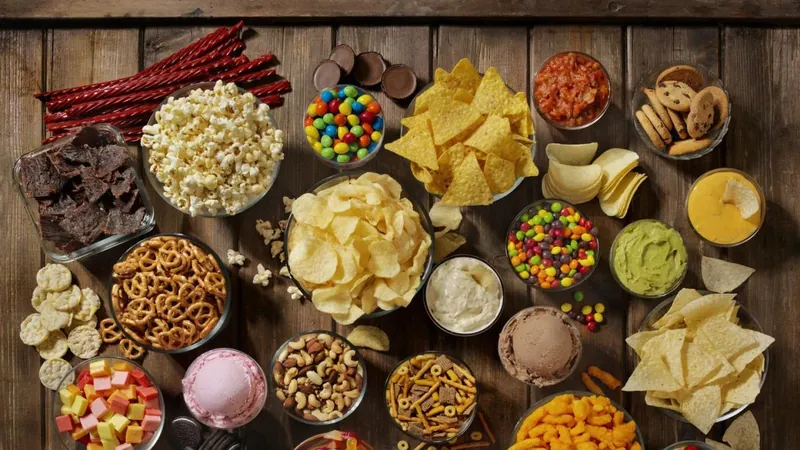
15 Foods to Ban from Your Diet for a Healthier Life
2025-01-21
Author: Wei
In our pursuit of better health, understanding what constitutes a "healthy" diet is crucial. According to the World Health Organization (WHO), an unhealthy diet abundant in saturated fats and sugars is a significant global health risk. These dietary choices heighten the risk of malnutrition and various diseases.
Dr. Francisco Lopez-Jimenez, a cardiologist at the Mayo Clinic, defines a healthy diet as one rich in whole, plant-based foods, including fresh produce, fruits, grains, legumes, and healthy fats like nuts and oils, while minimizing animal product intake. Nutrition expert Jim White, R.D.N., emphasizes the mantra "eat to live," suggesting that a nutritious diet not only prevents diseases but also supports overall energy and wellness.
While it's not necessary to completely eliminate certain foods, moderation and portion control are pivotal. White recommends consuming nutrient-dense foods 75% of the time, reserving the remaining 25% for indulgent treats.
Below, we spotlight 15 foods that health experts recommend you limit or reduce for an optimal diet:
1. Soda
This sugary beverage is notorious for its high sugar content, which the CDC links to obesity, diabetes, heart disease, and dental issues. Even seemingly harmless frozen coffee drinks can contain excessive sugar.
2. Raw or Undercooked Meat
This is especially risky for individuals with compromised immune systems or cancer, as it increases the chance of foodborne illnesses, which can severely affect vulnerable patients.
3. Breakfast Cereals
Many cereals are made from processed grains, which can cause spikes in blood sugar. Opt for whole grains instead.
4. Processed Meats
Cold cuts, sausages, and hot dogs may be detrimental to heart health. Studies suggest a correlation between processed meats and an increased risk of heart disease.
5. Alcohol
Often labeled as "empty calories," alcohol can slow down fat metabolism and has been linked to a shorter life expectancy, particularly harmful for cancer patients undergoing treatment.
6. Trans Fats
Found in some baked and fried goods, these fats are associated with significant increases in cardiovascular risk.
7. Sports Drinks
While promoting hydration, these beverages often contain high sugar levels akin to sodas, contributing to liver complications over time.
8. Artificial Sweeteners
These calorie-free substitutes can disrupt gut health and potentially lead to weight gain, as they may affect insulin response and even nutrient absorption.
9. Fruit Juice
100% fruit juice lacks fiber and can result in increased blood sugar levels, rendering it less beneficial than consuming whole fruits.
10. Added Sugars and High Fructose Corn Syrup
Research shows that these sweeteners, present in many processed foods and drinks, are linked to obesity and diabetes due to their high caloric content and the difficulty of satiating hunger.
11. Refined Vegetable Oils
Often used for frying, these oils contain harmful compounds that contribute to oxidative stress, making them less healthy compared to natural fats.
12. Takeout and Restaurant Meals
These often contain excessive amounts of salt, sugar, and unhealthy fats which can disrupt bodily health metrics.
13. Processed White Bread
Typically low in nutrients and fiber, white bread can lead to blood sugar spikes. Whole grain options are preferable.
14. High-Fat Frozen Meals
Many frozen meals are loaded with preservatives and unhealthy fats, packing high calorie counts without adequate nutrition.
15. Donuts and Baked Goods
These treats are high in calories, sugar, and unhealthy fats, offering little nutritional benefit. Healthier alternatives could be homemade sweets made with wholesome ingredients.
In conclusion, while indulging occasionally is perfectly fine, focusing on nutrient-dense foods will contribute significantly to maintaining a healthy lifestyle. By making these simple dietary adjustments, you can mitigate health risks and support overall well-being.





 Brasil (PT)
Brasil (PT)
 Canada (EN)
Canada (EN)
 Chile (ES)
Chile (ES)
 Česko (CS)
Česko (CS)
 대한민국 (KO)
대한민국 (KO)
 España (ES)
España (ES)
 France (FR)
France (FR)
 Hong Kong (EN)
Hong Kong (EN)
 Italia (IT)
Italia (IT)
 日本 (JA)
日本 (JA)
 Magyarország (HU)
Magyarország (HU)
 Norge (NO)
Norge (NO)
 Polska (PL)
Polska (PL)
 Schweiz (DE)
Schweiz (DE)
 Singapore (EN)
Singapore (EN)
 Sverige (SV)
Sverige (SV)
 Suomi (FI)
Suomi (FI)
 Türkiye (TR)
Türkiye (TR)
 الإمارات العربية المتحدة (AR)
الإمارات العربية المتحدة (AR)